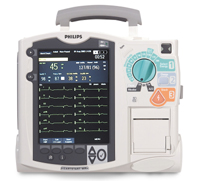Intellectual Property
What is Intellectual Property?
Intellectual Property (IP) is the creative and innovative ideas that are assets in the same way that physical property is a tangible asset. Intellectual Property Rights (IPR) are the rights obtained to use and protect the intellectual property.
Five types of intellectual property right exist to protect the different aspects of knowledge and ideas – patents, copyright, design rights, trade marks and know-how.
Examples of the five types of IP:
| Category | Right | Examples | ||
| Inventions | Patents | New medical device, medicinal substance | ||
| Literary works | Copyright | Computer software, patient leaflet | ||
| Designs, drawings | Design rights | Medical illustration, medical device | ||
| Brand names | Trade marks | Trust logo, equipment logo | ||
| Trade secrets | Know-how, knowledge | Surgical technique |

Defibrillator – Photo courtesy of Philips Medical Systems
For example, in a defibrillator: ‘PHILIPS’ is a registered trade mark; the appearance of the device may be protected by using registered designs; the technology in the device may be protected by using patents.
These pages describe the different types of IP.
Why it is important to identify IP?
As IP is an asset, it is important that the organisation that owns it is aware of its existence. It is therefore a requirement of the Research Governance Framework for Health and Social Care that IP generated within health and social care organisations is identified.
Why is it important to protect IPR?
The development of new healthcare products involves a substantial investment (time, people, financial), with a lack of certainty that healthcare providers will adopt new technologies.
Potential investors need to minimise their risks associated with the development of such technologies by ensuring they have exclusive rights to the resulting product.
Unless the IP in a product is protected and available, companies and investors are unlikely to be interested in developing a technology. This means products that could offer healthcare benefits to patients and society may be lost.
